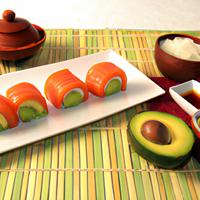
1 serving (150 grams) contains 250 calories, 12.0 grams of protein, 10.0 grams of fat, and 30.0 grams of carbohydrates.

Log this food in SnapCalorie

Nutrition Information
Calories |
400.0 | ||
|---|---|---|---|
% Daily Value* |
|||
| Total Fat | 16.0 g | 20% | |
| Saturated Fat | 3.2 g | 16% | |
| Polyunsaturated Fat | 0 g | ||
| Cholesterol | 32.0 mg | 10% | |
| Sodium | 640.0 mg | 27% | |
| Total Carbohydrates | 48 g | 17% | |
| Dietary Fiber | 4.8 g | 17% | |
| Sugars | 3.2 g | ||
| protein | 19.2 g | 38% | |
| Vitamin D | 160.0 mcg | 800% | |
| Calcium | 32.0 mg | 2% | |
| Iron | 1.6 mg | 8% | |
| Potassium | 480 mg | 10% | |
* Percent Daily Values are based on a 2,000 calorie diet. Your daily values may be higher or lower depending on your calorie needs.
Food Attributes
Source of Calories
About Salmon and avocado sushi
Salmon and avocado sushi is a popular dish in Japanese cuisine, celebrated for its fresh, flavorful ingredients and balance of textures. Typically rolled with sushi rice, nori (seaweed), fresh salmon, and ripe avocado, this combination creates a delightful mix of richness and creaminess. Salmon is a powerhouse of omega-3 fatty acids, essential for heart health and brain function, as well as high-quality protein for muscle repair. Avocado adds a dose of healthy monounsaturated fats, fiber, and vital nutrients like potassium and vitamins E and C. While generally nutritious, sushi rice is seasoned with sugar and vinegar, which may slightly increase carbohydrate content and overall calories. It’s also worth noting the sodium levels if paired with soy sauce. Nonetheless, this dish remains a well-balanced option, offering a wholesome blend of nutrients in a convenient and enjoyable format.



